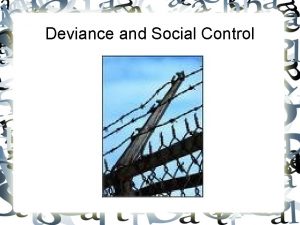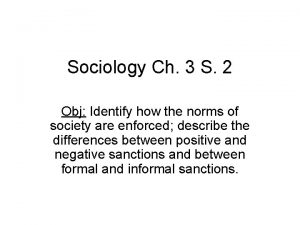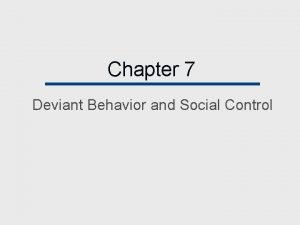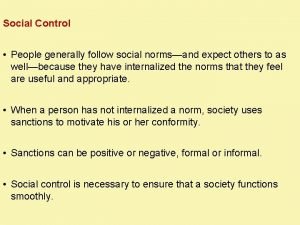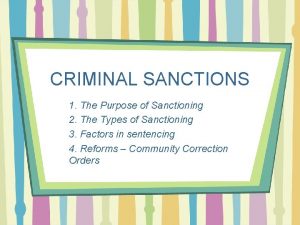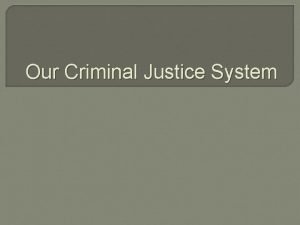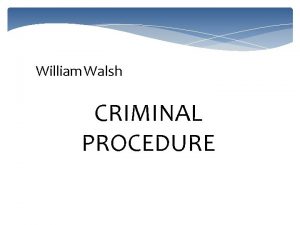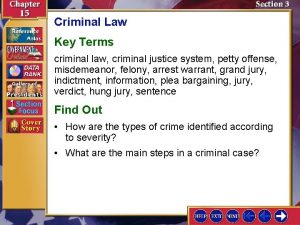CRIMINAL SANCTIONS The purpose of imposing sanctions A








- Slides: 8

CRIMINAL SANCTIONS

The purpose of imposing sanctions • A sanction is an outcome available to the courts in a criminal case, such as imposing a term of imprisonment, a fine or a community-based order. The parliament provides guidelines to the courts in terms of maximum penalties to be imposed for each particular sanction. A sentence is the actual outcome that was imposed to suit the factual issues of that particular case.

The Sentencing Act 1991 provides the five purposes of sentencing adult offenders in Victoria.

• Just punishment - The sentence imposed must be fair and reasonable and based purely on evidence presented at trial. • Deterrence - Punishment is often inflicted with the intention of setting an example to others. This has a twofold effect — it attempts to deter others in society from committing similar crimes (referred to as general deterrence) and it discourages the offender from continuing with a life of crime (referred to as specific deterrence). If this is the case, the sanction may be selected for its severity rather than its appropriateness. • Rehabilitation • All offenders must be given the opportunity to change their behaviour so that they become valuable members of society. Drug and alcohol programs are targeted at some offenders, who often require treatment to prevent further criminal conduct. Governments also have introduced a range of measures designed to keep offenders living in the community rather than sending them to prison for example a drug user may be required to undergo counselling and enter a drug rehabilitation program.

• Denunciation of offender's conduct - Sanctions are imposed to express to offenders that society believes that their conduct was inappropriate and deserving of punishment. • Protection - Protection of the community is only guaranteed by the removal of an offender from society through imprisonment. An indefinite sentence can be imposed on someone who has previously been convicted of a similar crime and who has served time in prison, because the court believes the offender is a serious threat to the community

Factors to consider in sentencing • If the accused is found guilty, it is the task of the judge or magistrate to determine a sentence. Various factors affect the sentence a person will receive. The court then hears further information to assist the judge in this regard. • Prior convictions - are previous offences committed by the defendant for which a conviction was recorded. If the person has prior convictions, the eventual sentence is likely to be more severe than if the person has a ‘clean record’. • Plea in mitigation - The defence counsel usually will call on character evidence to the effect that the defendant is a reliable and honest person who should not receive a harsh sentence. If a defendant has convincing character referees, this may reduce the sentence.

Factors to consider in sentencing • The remorse shown by the offender • The offender's circumstances - the offender's personal circumstances may, to some extent, shed light on the offender's behaviour. The court considers factors such as age, cultural or family background, mental health and any addictions such as drug and alcohol addiction that might indicate the offender's level of ‘responsibility’ for the crime. • Early guilty pleas - In 2010 it was announced that the ‘sentence indication scheme’ would become a permanent feature of the criminal justice system. The scheme allows the judge to indicate before trial whether or not a custodial sentence is likely and this provides defendants with another opportunity to plead guilty and accept the responsibility of their crimes. • Victim impact statements - A further consideration in sentencing is the suffering of victims

Activity • Read the Hinch case and answer the “Apply your understanding” questions


